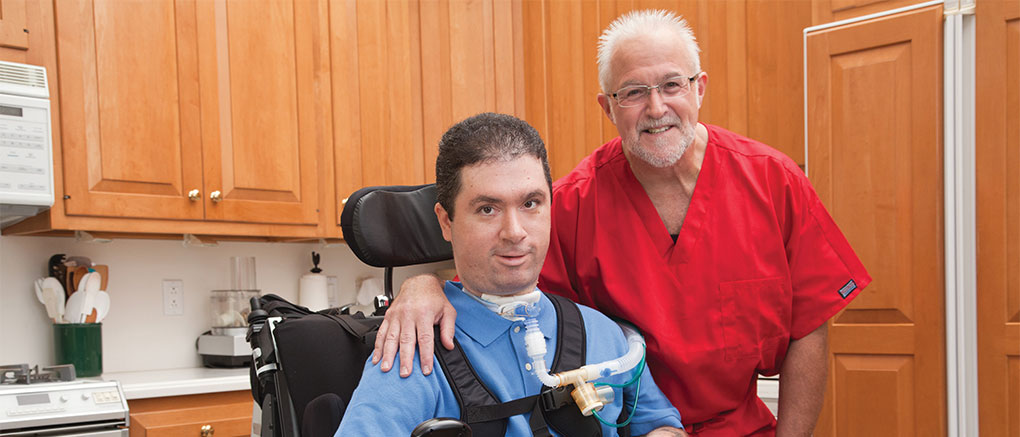Find Care by Condition or Disease
Every day BAYADA helps thousands of clients, each with their own unique needs and customized care plan. Below are some of the most common conditions our clients are managing with the help of our care services. Since we serve clients with such a wide variety of diagnoses, it would be impossible to include each one. So, if you need help with a disease or condition not listed here, please contact us to discuss how BAYADA can help.
- Alzheimer's disease
Alzheimer’s disease is one of the most common causes of dementia, the set of symptoms that include memory loss, personality changes, and impaired reasoning.
See Dementia » - Amyotrophic lateral sclerosis (ALS)
Amyotrophic lateral sclerosis (ALS), also known as Lou Gehrig’s disease, is a progressive neurodegenerative disease that affects motor neurons in the brain and spinal cord, causing a loss of muscle function throughout the body. BAYADA has partnered with The ALS Association to create a training program for home caregivers specializing in care for clients with ALS.
Learn more about BAYADA'S ALS care » - Autism Spectrum Disorder
Autism, or autism spectrum disorder (ASD), refers to a broad range of conditions characterized by challenges with social skills, repetitive behaviors, speech, and nonverbal communication. According to the CDC, autism affects an estimated 1 in 36 children in the United States.
Learn more about BAYADA’s autism and Applied Behavior Analysis (ABA) services - Cerebral palsy (CP)
Cerebral palsy (CP) is a disorder that is characterized by impaired movement, muscle tone, and motor skills, as well as possible cognitive delays. It is typically caused by damage to the brain during pregnancy or shortly after birth. Home care can help maximize independence and mobility, while also managing some of the specific medical issues associated with cerebral palsy. - Chronic obstructive pulmonary disease (COPD)
Chronic obstructive pulmonary disease (COPD) is a progressive lung disease that makes it increasingly difficult to breathe, and often includes symptoms of chronic bronchitis and emphysema. Home health care from BAYADA can help by providing education on how to self-manage symptoms, and if a flare-up or setback occurs, home care can help manage those exacerbations to get clients back on track. - Dementia
Dementia is not a specific disease; it is a term used to describe a set of symptoms such as memory loss, personality changes, and impaired reasoning. Irreversible dementia is a symptom of another disease or disorder, such as Alzheimer’s disease, mini-strokes (vascular dementia), Lewy body dementia, or Pick’s disease. As dementia progresses, the cognitive decline can become severe enough to affect a person’s abilities to safely perform activities of daily living (ADLs). Compassionate support and careful supervision provided by BAYADA professional caregivers can help a client with dementia to live at home as independently as possible, while giving their family peace of mind that their loved one is safe and engaging in meaningful activities.
Learn more about BAYADA's dementia and Alzheimer's care » - Diabetes
Diabetes is a metabolic disease where the body’s inability to produce enough insulin results in too much glucose in the blood (also known as “high blood sugar”). Managing diabetes often requires special attention to diet and exercise, and may require medication and insulin injections. Home health care from BAYADA can help by teaching an individual how to manage their diabetes symptoms at home on their own, with guidance on maintaining proper nutrition and hydration, monitoring blood sugar, managing medications, and living a healthy lifestyle. Home care can also help with recovery from any related complications from diabetes. - Heart failure
Heart disease or heart failure is a chronic condition where the heart’s ability to pump is weaker than normal, and therefore, can’t pump enough oxygen and nutrients to meet the body’s needs. If left untreated, it can lead to kidney complications and fluid retention (congestion) in the body, which is why it is sometimes called congestive heart failure. Heart disease may be managed appropriately with medication and lifestyle changes. BAYADA home health care can help by providing education and support to help proactively manage symptoms at home, and should there be complications, home care will be able to further assist as needed. - Hypertension
Hypertension, also known as high blood pressure, means that the force of the blood pushing against blood vessel walls is too strong, making it harder for the heart to pump out blood to the body. Over time, it can lead to other conditions such as stroke, kidney disease, and heart failure, so it is important to manage high blood pressure proactively. Our home health care services can help by providing education on how to manage high blood pressure at home, including taking accurate measurements, monitoring fluctuations, making healthy lifestyle choices, and knowing when to call the doctor. - Joint replacement
Joint replacement surgery is a treatment for damaged or dysfunctional joints in the body, such as a knee or hip. After surgery, BAYADA can help with the initial transition home and provide rehabilitative therapy and assistance with recovery. - Managing a setback from a chronic condition
Education and rehabilitative visits from our home health care nurses and/or therapists can help individuals manage setbacks due to their chronic medical conditions to prevent an unnecessary hospitalization. - Multiple sclerosis (MS)
Multiple sclerosis (MS) is an autoimmune disease in which a person’s immune system begins to attack the protective covering of the nerve cells in the brain and spinal cord. Symptoms vary from person to person, and can include numbness, speech impairment, vision problems, and fatigue, among others. BAYADA can provide education on managing symptoms and administering medication, and also provide compassionate care and assistance with the activities of daily living (ADLs) that can become increasingly challenging with MS as it progresses. - Muscular dystrophy (MD)
Muscular dystrophy (MD) is a group of more than 30 diseases that are characterized by progressive weakness and degeneration of the muscles that control movement. Muscular dystrophies are hereditary diseases that can be seen in infancy or childhood, or not until middle age or later. As the disease progresses, BAYADA can provide reliable assistance with activities of daily living (ADLs), as well as compassionate nursing care, therapy, and ongoing moral support. - Paraplegia
See Spinal Cord Injury - Quadriplegia
See Spinal Cord Injury - Recovery after a hospital stay, illness, or injury
Physician-prescribed home health care allows clients to continue their recovery in the comfort of their own home after a hospital stay, illness, or injury. Depending on the circumstances, care may include visits from a BAYADA Nurse to help with medical needs and BAYADA Therapists to help restore mobility and improve the ability to perform everyday tasks. - Respiratory failure
Respiratory failure, sometimes called lung failure, is a condition in which not enough oxygen is passing from the lungs into the bloodstream, resulting in either dangerously low oxygen levels, or dangerously high carbon dioxide levels. Respiratory failure can be caused by a number of different conditions and may come on abruptly, or slowly over time. As respiratory failure progresses, patients may require the help of a mechanical ventilator to breathe. BAYADA Nurses specially trained in ventilator care can enable a client to remain safe at home. - Spinal muscular atrophy (SMA)
Spinal muscular atrophy (SMA) is is caused by a genetic mutation affecting the motor neurons in the spinal cord. It results in progressive muscle degeneration and weakness that ultimately takes away the ability to walk, eat, or breathe. BAYADA offers individualized, custom care by nurses and other caregivers who are experts in understanding and managing the complexities of SMA and its symptoms and side effects. - Spinal cord injury (SCI)
A spinal cord injury (SCI) most often occurs as the result of a sudden, traumatic blow to the spine. The exact location of the injury determines the severity and extent of the damage and the resulting loss of function. This may include partial or complete paralysis in the form of paraplegia (paralysis of the lower extremities) or tetraplegia—also called quadriplegia—(paralysis of both the arms and legs). BAYADA’s in-home rehabilitation program is the first and only of its kind and provides a high level of specialized care for those living with a spinal cord injury. BAYADA has extensive rehabilitative care experience to help clients live their lives to their greatest ability.
Learn more about BAYADA's Brain and Spinal Cord Injury care » - Stroke
A stroke occurs when a portion of the brain does not receive the oxygen it needs, either because there is a blockage, leak, or rupture. Depending on the location of the event, the side effects may include speech impairment, memory loss, and impaired mobility, among other things. BAYADA Nurses, Therapists, and Home Health Aides can help clients achieve optimal independence through rehabilitation and care in the home. - Tetraplegia
See Spinal Cord Injury - Traumatic brain injury (TBI)
A traumatic brain injury (TBI) occurs when an outside force, such as a blow to the head, causes brain dysfunction. BAYADA can help with the transition home after a hospital or rehabilitation facility stay, and our skilled staff of nurses, therapists, and home health aides can provide compassionate assistance with all aspects of rehabilitation and care at home.
Learn more about BAYADA's brain and spinal cord injury care »





